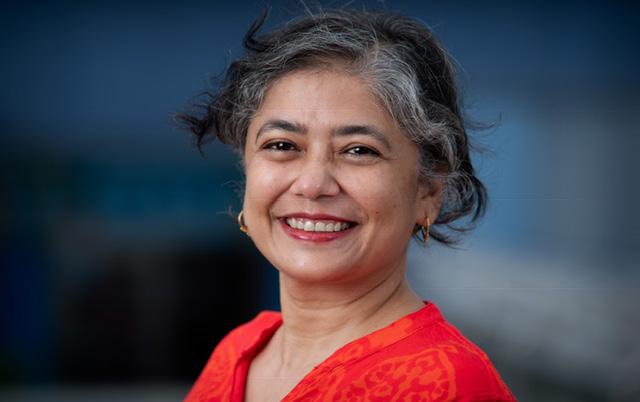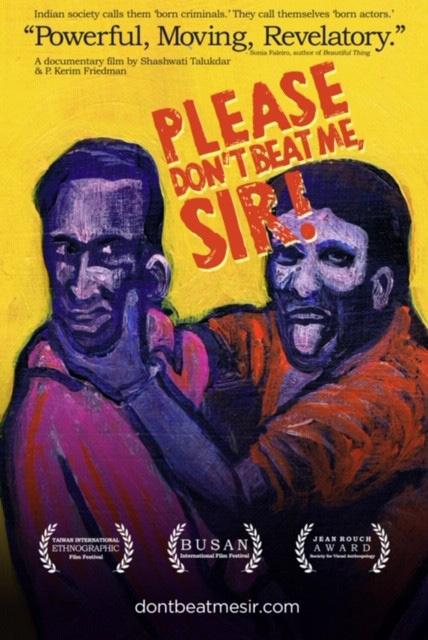
5 minute read
At the Edge of the Absurd
Filmmaker Shashwati Talukdar tests the limits of language and expression in her work
ALPANA VARMA
Shashwati Talukdar, already a reputed documentary filmmaker, is now getting noticed as a playwright.
Now living in Taipei with her husband P Kerim Friedman, an anthropology professor at the University of Taipei, she is pleased with the artistic activity in the area, which helped her rediscover her love for the theater she dabbled in while at college.
“Taipei has a small but vibrant theater scene, incredibly well-trained actors and a lot of people from all over the world,” says Talukdar. It helps that normal life was not affected by the pandemic, thanks to the deft handling of the situation by the island’s government.
Talukdar’s latest foray into theater, however, was a livestream play reading event held in New Delhi, London and San Francisco, in October 2020. Organized for the Same Boat Collective, at an event dubbed “Earthquake,” the idea was to move the earth with human voices for environmental justice.
The one-act play, “Hari and Ramesh get Flooded in Mumbai,” is a comedy about two characters on opposite sides of the globe and how they deal with a crisis.
“It’s about global warming and people being brainwashed by conspiracy theories,” Talukdar says.
“What draws me to plays,” she says, “is the symbolic space, and the basic raw material of theater … in threedimensional space, and how I can use language – bend it in ways that one doesn’t while making films.”
Talukdar finds working with theater actors to be very different than dealing with them in films. “The psychological and sensory experience is very different, almost painful actually. But one is always glad for it,” she says.
Born and raised in Dehradun, India, Talukdar earned her bachelor’s degree at Lady Shri Ram College, and then her master’s degree in mass communications at Jamia Miillia Islamia University, both in New Delhi. She also attended Temple University in Philadelphia, where she earned a master’s degree in fine arts.
Talukdar has written a series of plays around Indian freedom fighter Subhash Chandra Bose, called the Bose Cycles.
“Your Country Needs You” is about a politician, a secret service agent and a person of an impossible age, wrestling with the question, “Who are you.” These were produced by Alicia Haddad and John Brown in 2019. The second play, “The Memory Stratagem,” was staged the same year. “The Return of the Hero” has Bose traveling between old memories
Filmmaker Shashwati Talukdar
and the uncertainties of the present during a flight to New Delhi. He is accompanied by an ambiguously shaded monk, who could be either a disciple or a jailer.
“These plays are about how he is thought about in contemporary India,” Talukar tells SEEMA, adding that she has a couple of more plays to add to the series. She is contemplating a full-length play on the subject of history as an instrument of politics, the undergirding question being that if a historical figure could see the present how would they view the way their name was being used or abused.
“I saw the first play in March last year, and it worked well as a standalone,” wrote Diane Baker in Taipei Times.
“Camels in Outer Space,” another one-act play Talukdar wrote in 2018. was produced by Brook Hall in Taipei a the LAB Space 24hour festival. “Potted Plant Or Say Something If You See Something,” is another micro-play, written in 2016, produced by Lisa King of Butterfly Effect Company, Taipei.
According to Talukdar, “I am always prompted by something that is happening around me, but the texts themselves tend to be in the realm of the absurd. Interestingly, the themes do start with something political, or I would prefer to say, some contemporary concern, and then move on to explore other themes of human existence.”
Taludkar, who divides her time between Dehradun and Taipei, is working on “Marriage Cops,” a film about a helpline at a women’s police station in Dehradun. Among other things, the play shows that while trained to be cops, women constables often deal with their own domestic disputes.
“I am just following a couple of women’s stories, the role of the policewomen and how these things unfold in a police station,” Talukdar says.
Some of her most notable works include a feature length documentary, “Please Don’t Beat Me Sir” (2011), about the Budhan Theater, a theater group composed of members of India’s Chhara, once deemed a criminal’ tribe; “Wall Stories” (2014), about the murals of the Guru Ram Rai Durbar in Dehradun; “The Girl,” a narrative Himalayan Gothic short; and “The Sound of Bombs,” an art video to promote writer Sharbari Zohra Ahmed’s book, “The Ocean of Mrs Nagai.”
Talukdar’s oeuvre includes documentaries, and narrative and experimental films, that have been screened at venues such as the Margaret Mead Film Festival, the Institute of Contemporary Art in Philadelphia, the Busan International Film Festival and the Whitney Biennial.
Asked why she particularly prefers documentaries, she takes refuge in a cliché: “Truth is stranger than fiction.”


Quizzed about how she comes up with ideas, Talukdar says, “Things come to you in different ways. Sometimes it is a compelling conversation or something you’ve read.”
She says it is hard for women filmmakers, since stereotypes still rule people’s viewpoints, ensuring that women find it harder to get hired, to get equitable pay, and to prise the money out of the hands of men, who tend to control the finances. Though dealing with a female crew is easier, that is not always the case, she says.
Talukdar says she likes to immerse herself in a community for a few years before works on a documentary involving it.
“It tends to be a long-drawn association with the community,” she says. “It takes time and commitment to develop the trust with its members and the ethics of documentary filmmaking are very important.”










